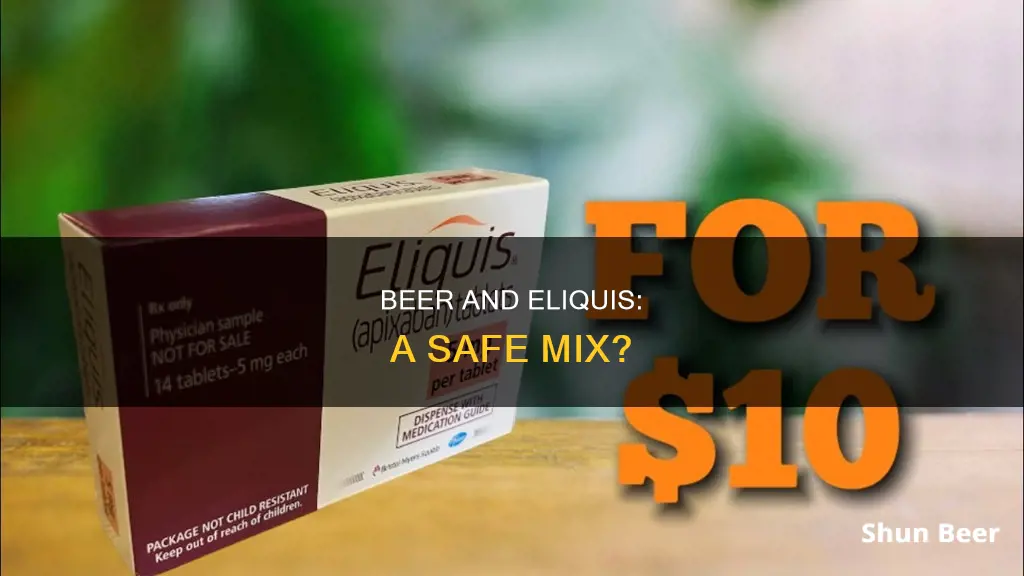
Eliquis is a popular blood thinner that has seen a significant increase in prescriptions in the U.S. in recent years. It is used to reduce blood clotting and prevent strokes and is usually prescribed for patients at risk of blood clots and strokes. While the prescribing information for Eliquis does not specifically warn against alcohol use, it is important to understand the potential risks of mixing alcohol with this medication. Alcohol acts as a natural anticoagulant and can increase the risk of bleeding, especially when consumed with blood thinners like Eliquis. In this article, we will discuss the potential dangers of drinking beer or other alcoholic beverages while taking Eliquis and provide recommendations for safe consumption.
| Characteristics | Values |
|---|---|
| Alcohol and Eliquis | Alcohol does not directly interact with Eliquis, but it may act as a blood thinner, potentially increasing the risk of bleeding. |
| Alcohol and Blood Thinners | Alcohol acts as a natural anticoagulant and can increase the time it takes for someone to stop bleeding. |
| Eliquis and Bleeding Risk | Eliquis is a blood thinner that slows down blood clotting in the body and increases the risk of bleeding. |
| Alcohol Consumption Guidelines | For healthy adults, doctors recommend limiting alcohol intake to a maximum of two drinks a day for males and one drink a day for females. |
| Eliquis and Alcohol Consumption | It is best to avoid alcohol intake when taking Eliquis unless a healthcare provider advises otherwise. |
What You'll Learn
- Eliquis and alcohol may both act as blood thinners, increasing the risk of bleeding
- Excessive alcohol use can lead to poor anticoagulation control, resulting in a higher risk of major bleeds
- Alcohol can increase the time it takes for someone to stop bleeding, similar to a blood thinner
- Drinking alcohol while taking Eliquis may cause internal bleeding, such as in the brain, stomach, and intestines
- People with liver problems may need to limit their alcohol consumption more strictly

Eliquis and alcohol may both act as blood thinners, increasing the risk of bleeding
Eliquis is a prescription medication that slows down blood clotting in the body. It is prescribed for patients at risk of blood clots and strokes. It is also used to treat existing clots and prevent further clotting. Eliquis is an anticoagulant, a type of medicine that makes the blood clot more slowly.
While Eliquis does not directly interact with alcohol, both substances may act as blood thinners, increasing the risk of bleeding. Alcohol can also affect how long it takes for someone to stop bleeding, similar to blood thinners. As such, consuming alcohol while taking Eliquis may increase the risk of bleeding events, particularly gastrointestinal bleeds.
Some studies suggest that moderate alcohol consumption (up to one drink per day for women and up to two drinks per day for men) can be safe while taking Eliquis, as long as the individual has no major medical problems and is in overall good health. However, it is important to consult with a healthcare professional before consuming alcohol while taking Eliquis, as there are several factors that can affect the level of risk.
For example, individuals with liver problems or impaired absorption rates may need to limit their alcohol consumption more strictly. Additionally, excessive alcohol use can lead to poor anticoagulation control in patients taking blood thinners like Eliquis, resulting in a higher risk of major hemorrhages. Alcohol consumption can also contribute to the development of cardiovascular disease, high blood pressure, and stroke, which are all risk factors when taking blood thinners.
Therefore, while moderate alcohol consumption may be safe for some individuals taking Eliquis, it is important to consult with a healthcare professional to understand the specific risks and make an informed decision.
Beer and Lomotil: Is It Safe to Mix?
You may want to see also

Excessive alcohol use can lead to poor anticoagulation control, resulting in a higher risk of major bleeds
It is important to understand the risks associated with combining alcohol and Eliquis (apixaban), a prescription medication used to prevent blood clots and reduce the risk of stroke. Excessive alcohol consumption, defined as more than 3 drinks per day or binge drinking, can have significant negative consequences for individuals taking Eliquis, primarily due to its effects on anticoagulation control.
When an individual takes Eliquis, it is crucial to maintain a consistent and therapeutic level of anticoagulation, which means that the medication is thinning the blood to an extent that effectively prevents clots from forming, without increasing the risk of bleeding. Excessive alcohol use can disrupt this delicate balance and lead to poor anticoagulation control.
Alcohol can affect the metabolism and excretion of Eliquis, causing fluctuations in its concentration in the bloodstream. This can result in periods where the medication is less effective at preventing clots, as well as periods where the risk of bleeding is heightened. Additionally, alcohol itself has an impact on platelet function and can enhance the anticoagulant effects of Eliquis, further contributing to the risk of bleeding.
Major bleeding is a serious complication that can arise from poor anticoagulation control. This includes bleeding within the brain, gastrointestinal tract, or joints. The risk of major bleeds is significantly higher when Eliquis is combined with excessive alcohol use, and these bleeds can be life-threatening or cause long-term disability. Therefore, it is crucial for individuals taking Eliquis to moderate their alcohol intake and avoid binge drinking to maintain effective anticoagulation control and minimize the risk of bleeding complications.
To ensure safe and effective use of Eliquis, it is recommended that individuals limit their alcohol consumption to moderate levels, typically defined as no more than 2 drinks per day for men and no more than 1 drink per day for women. It is also important to discuss alcohol use with your healthcare provider when starting Eliquis to receive personalized guidance and ensure a thorough understanding of the risks involved.
In conclusion, excessive alcohol use while taking Eliquis can lead to poor anticoagulation control and significantly increase the risk of major bleeds. To minimize this risk, individuals taking Eliquis should limit their alcohol intake to moderate levels and discuss their alcohol consumption with their healthcare provider to receive personalized advice and ensure a safe and effective treatment plan.
Drinking Beer in Your Front Yard: Legal or Not?
You may want to see also

Alcohol can increase the time it takes for someone to stop bleeding, similar to a blood thinner
Eliquis is a prescription medication that slows down blood clotting in the body. It is prescribed for patients at risk of blood clots and strokes. Alcohol, similarly, can also act as a blood thinner, preventing blood from clotting. This means that drinking alcohol while taking Eliquis can increase the risk of bleeding.
When you are injured, blood cells called platelets rush to the site of injury and clump together to form a blood clot, which stops the bleeding. Alcohol consumption leads to a lower number of platelets because it hinders the bone marrow's ability to produce these cells. It also changes their physical makeup, making them less sticky and therefore less able to stick together and form a clot.
The combination of alcohol and Eliquis can cause internal bleeding in the stomach, intestines, or brain. This can be life-threatening and requires emergency medical attention. Alcohol can also damage the lining of blood vessels, causing blood clots that can break off and trigger a stroke or heart attack.
Additionally, alcohol acts as a diuretic, causing fluid loss through urination. Diuretics can lead to dehydration, which is dangerous when taking blood thinners like Eliquis because dehydration can further increase the risk of bleeding.
While moderate alcohol consumption does not directly interact with Eliquis, it is important to note that both substances have a similar blood-thinning effect. Therefore, it is recommended to avoid alcohol intake while taking Eliquis unless advised otherwise by a healthcare provider.
Blood Thinners and Beer: Safe or Not?
You may want to see also

Drinking alcohol while taking Eliquis may cause internal bleeding, such as in the brain, stomach, and intestines
Eliquis is a prescription medication that slows down blood clotting in the body. It is a popular blood thinner prescribed to reduce blood clotting and has seen a significant increase in prescriptions in recent years. While Eliquis does not directly interact with alcohol, mixing the two can increase the risk of internal bleeding.
Both alcohol and Eliquis act as blood thinners and can increase the risk of bleeding, especially when consumed together. Alcohol can also damage the lining of blood vessels, causing blood clots that can break off and trigger a stroke or heart attack. This is especially dangerous for individuals taking Eliquis, as the combination can lead to internal bleeding in the brain, stomach, and intestines.
Drinking alcohol while taking Eliquis can cause gastrointestinal bleeds and increase the risk of bleeding in the brain, also known as intracranial hemorrhage. This is a dangerous and feared complication of oral anticoagulants, and users of blood thinners like Eliquis are ten times more likely to experience this type of bleeding. The pressure from the bleeding can push down on brain tissue, crushing it or causing a reduction in oxygen supply. In extreme cases, this can lead to brain herniation, where the flexible fat structures of the brain are squeezed and rendered nonfunctional.
Additionally, alcohol consumption can cause gastritis (inflammation of the stomach lining) or peptic ulcer disease (PUD), which can lead to stomach bleeding. Mixing alcohol with Eliquis can also affect the absorption rate of the medication, impacting its effectiveness in preventing blood clots.
To summarize, drinking alcohol while taking Eliquis may increase the risk of internal bleeding, especially in the brain, stomach, and intestines. It is essential to consult a healthcare provider for personalized advice, as individual factors can affect the reaction to mixing alcohol and Eliquis.
Beer Overdose: Heat Cramps and Excessive Drinking
You may want to see also

People with liver problems may need to limit their alcohol consumption more strictly
Eliquis is a blood-thinning medication that slows down blood clotting in the body. It is prescribed to patients at risk of blood clots and strokes. While the prescribing information for Eliquis does not specifically warn against alcohol use, individuals taking this medication should be aware of the risks associated with consuming alcohol while on this medication.
In addition to the potential impact on liver function, excessive alcohol consumption can also increase the risk of certain bleeding events, particularly gastrointestinal bleeds. Alcohol acts as a natural anticoagulant, so when combined with Eliquis, the risk of bleeding may be further elevated. This is especially true for those with impaired absorption rates, such as older adults.
The combination of alcohol and Eliquis can also affect the rate at which the body absorbs the medication. Eliquis works most effectively when taken at consistent times, and alcohol can interfere with the body's ability to absorb the drug at a steady pace, potentially impacting its effectiveness in preventing blood clots.
It is essential for individuals taking Eliquis to be aware of these risks and to consult their healthcare provider for personalized advice. The healthcare provider will consider the individual's unique situation, including medical history, risk factors, and medications, to determine if moderate alcohol consumption is safe or if alcohol should be avoided altogether.
Chilling Beer Fast: How Do Chiller Sticks Work?
You may want to see also
Frequently asked questions
Eliquis is a blood thinner, so drinking alcohol while on this medication may increase the risk of bleeding. It is best to consult a doctor before drinking any alcohol while taking Eliquis.
Combining alcohol and Eliquis may increase the risk of bleeding, especially in the gastrointestinal tract, stomach, intestines, or brain. This can be life-threatening and requires immediate medical attention.
It is recommended to limit alcohol intake to a maximum of two drinks per day for males and one drink per day for females. Drinking more than the recommended amount may increase the risk of cardiovascular disease and alcohol use disorders.
Some red flags that indicate the need to seek immediate medical attention include large amounts of visible blood loss from physical injuries, heavier menstrual bleeding than usual, tar-like or red stools, and bleeding gums or nosebleeds that do not stop.
In addition to the increased risk of bleeding, drinking alcohol while taking Eliquis may affect the absorption rate of the medication, impair judgment, and increase the risk of falling or other injuries.







